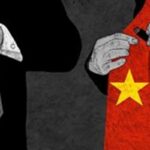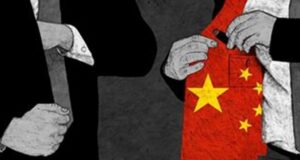
Although many regard the recent 90-day pause in the U.S.-China tariff war as a ringing defeat for the U.S. side, China scholar Steven Mosher contends that “China blinked—and Trump clearly won the first round of his tariff war” (New York Post, May 17, 2025).
30 million
The United States and Donald Trump had Xi Jinping and China on the ropes.
“Trump was under little domestic pressure to back off of Beijing, skittish global markets notwithstanding. Xi Jinping, however, was desperate to make a deal…. Had the high tariffs continued, over 50% of export companies would have gone under, and 30 million workers would have been on the streets.”
Mosher states that although only about 16% of China’s exports go to the U.S., those sales account for something like half of China’s export profits “because we buy in bulk and pay on time.”
The 16% figure is more or less true according to other sources; the International Monetary Fund says, though, that the U.S. share of China’s exports dropped from 16.7% in 2019 to 14.8% in 2023. Less clear is the basis for Mosher’s claim that exports to the United States account for as much as 50% of the profits of China’s export industry. Nor is China issuing statistics about its economy with such comprehensiveness and veracity that we can really trust the numbers we do have anyway.
Whatever the real numbers, long-term loss of trade with the U.S. would have been substantial enough to cause massive new unemployment in China. During the few weeks of the 165% tariffs, we were already seeing reports about the drastic impact on China’s economy.
The pause-deal included a U.S. agreement to (temporarily) reduce tariffs on Chinese imports to “just” 30%, down from 165% or more. And China “made some major concessions, reducing its tariff rate on US goods to 10% and, even more important, promising to stop the flow of deadly fentanyl into the US.”
Fentanyl is not mentioned in the “Joint Statement on U.S.-China Economic and Trade Meeting in Geneva.” But a White House fact sheet states that the U.S. and China “will take aggressive actions to stem the flow of fentanyl and other precursors from China to illicit drug producers in North America.”
China’s next moves
The Chinese Communist Party doesn’t necessarily keep its promises. During the Biden years, China reneged on a 2020 agreement with the first Trump administration because, as China’s negotiators this time around admitted, “Biden was weak.”
Now, however, “Fear of renewed tariff hikes may finally force China’s cooperation, not just in stopping the fentanyl trade, but in ending the laundering of dirty cartel money through China’s banks, and perhaps even in revealing the location of the labs themselves. Trump should demand no less.”
President Trump refrained from pushing the Chinese economy into collapse “with all of the unpredictable consequences that might ensue for the Chinese people and the world. But now he knows he could. And, equally importantly, the Chinese leadership knows this too. They also know that, this time around, Trump is starting early—still has plenty of time to act if they renege on the deal.”











